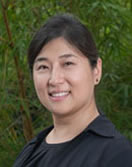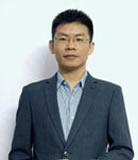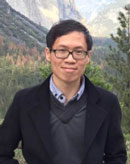| |
|
|
|
| |
 |
Dr. Colleen Chiu-Shee (裘熹) is Assistant Professor in the Department of Urban and Regional Planning at University of Illinois Urbana-Champaign. From May 2022 to July 2023, she was Assistant Professor in the Department of Urban Planning and Design at the University of Hong Kong and Assistant Director of HKU’s Master of Urban Design program. Since 2022, an Associate at National University of Singapore’s Asia Research Institute (ARI), after working as a Postdoctoral Fellow in ARI’s Asian Urbanisms Cluster. From 2020 to 2021, she served as a Global Public Voice Fellow for the Global Racial Justice Initiative at Cornell University’s Mario Einaudi Center for International Studies. She practiced architecture, urban design, and community planning in China and the U.S., before receiving Ph.D. in Urban and Environmental Planning and Design from Massachusetts Institute of Technology’s Department of Urban Studies and Planning. |
|
| |
|
|
| |
My research concerns “eco” and “smart” urban futures—a topic that emerged during my fieldwork in China, Southeast Asia, and North America. I explore innovative spatial and sociopolitical interventions that seek to transcend preexisting paradigms to promote environmental sustainability and social justice. My dissertation, titled Ecological City Design and Planning: How China Expands Urban Ecology, Institutional Learning, and Cultural Shifts through the Evolving Eco-Developments, examines how developing countries forge adaptive capacity under the pressure of environmental degradation and urbanization through the lens of eco-city experiments in China. I have also collaborated to develop research projects that connect scholarship in North America with practice in Asia. These projects have examined a range of topics, including housing development, urban informality and land politics, land reclamation and coastal development, masterplanned new cities, collective governance and urban resilience, climate adaptation in vulnerable communities, and digital technologies for pandemic management. China has been a crucial site for theorization in these studies. For example, the paper “A Burden or A Tool? Rationalizing Public Housing Provision in Chinese Cities” (Housing Studies, DOI: 10.1080/02673037.2019.1667490) situates China’s public housing policy in global debates about housing affordability in the mixed economy of welfare, analyzes central-local structural barriers in the political system, and identifies pathways to equitable, inclusive housing provision. Another paper “Ending Gated Communities: the Rationales for Resistance in China” (Housing Studies, DOI: 10.1080/02673037.2021.1950645) engages international debates about gated communities and provides a nuanced portrayal of the conflicting and conflicted rationales for gating/ungating in China. The battle over gated communities is emblematic of China’s broader political struggle, as well as dilemmas in the private production of public goods. My work continues investigating similar concepts and practices across cultures and geographies to reveal the global mobilities of ideas and policy innovation |
|
| |
|
|
|
| |
 |
Dr. Wang Kun obtained his Ph.D. from The University of Hong Kong in 2019 under the supervision of Prof. Shenjing He. He served as a postdoctoral research fellow at The Chinese University of Hong Kong from 2019 to 2021, collaborating with Prof. Xujiang and Dr Calvin King Lam Chung. In 2021, he joined the Guangzhou Institute of Geography as a Research Associate Professor and then was included in the "Hundred Talents Program" initiated by Guangdong Academy of Sciences. He served as a Visiting Associate Professor at The University of Hong Kong in 2022.
汪坤 2019年获得香港大学博士,导师何深静教授。2019-2021任职香港中文大学博士后研究员, 合作导师为徐江教授、Calvin King Lam Chung博士。2021年入职广州地理研究所,任职特聘副研究员, 入选“广东省科学院百人计划D类”。2022年期间曾任香港大学访问副教授。
|
|
| |
|
|
| |
Dr. Wang Kun’s research focuses on the intersection of geographies of waste, political ecology, and post-structuralist geography. His major research works have been published in reputational journals in geography or urban/regional studies. His ambition is to infuse nuanced perspectives into the forefront of international discourse on waste and environmental studies by intertwining these debates with the intricacies of vernacular socio-cultural fabrics and the dynamism of China's politico-economic transition. With a focal point on the illicit e-waste recycling epicentres in China, his article published in Annals of the American Association of Geographers theorizes how nonhuman agency plays an instrumental role in the making of plural environmental justice realities. This work contrasts distributional and capability perspectives on environmental justice that emerge from heterogeneous associations between human and nonhuman entities. In another piece published in Urban Geography, he engages China’s campaign-style environmental governance with the multiple governmentality thesis, scrutinizing the intersection of sovereign environmentality with neoliberal, disciplinary, and truth-based environmentalities; His exploration of the material circulations and geographic articulations between "Global Production Networks" and "Global Destruction Networks" from a cultural economic approach earned him the prestigious Ashby Prize 2022, an accolade awarded for the most innovative paper in the EPA journal; More recently, his contribution to the Handbook on China’s Environmental Governance, edited by Fangzhu Zhang and Fulong Wu, involves an examination of the evolving dispositifs of China's environmental governance during its political-economic transition from state-entrepreneurialism to state-led ecological civilization. He received the Youth Fund of the National Natural Science Foundation of China for a project titled "Environmental Governance of e-waste Pollution: An urban political ecology perspective". He serves on the Junior Editorial Board of Tropical Geography (Chinese) and acts as a journal reviewer for Urban Studies, International Journal of Water Resources Development, Critique of Anthropology, and leading Chinese geographical journals. 汪坤博士的研究集中在废弃物地理、政治生态学和后结构主义地理学的交叉领域。他的主要研究成果已在地理学或城市/区域研究的知名期刊上发表。他致力于介入国际废物和环境研究的理论前沿,并阐述中国政治经济转型与地方尺度的特定社会文化本底的动态交织如何与这些国际理论对话。以中国非法电子废物回收中心为研究焦点,他在《Annals of the American Association of Geographers》上发表的论文,尝试概念化“非人行动者(nonhuman actors)”在构建环境公正的多元事实中所发挥的关键作用。此项工作通过追踪电子垃圾拆解的行动者-网络,阐释了形形色色的非人行动者及其物质性(如电子废物的资源性、商品性、污染性、健康毒性等)与多元人类利益相关者(如国际NGOs组织、媒体、学者、本地拆解者等)之间如何形成不同的“异质性联结(heterogeneous association)”,共同构筑了充满争议和冲突的环境正义世界;’在另一篇发表在《Urban Geography》上的文章中,他将中国的运动式环境治理带入与多元治理术理论(multiple governmentalities)的对话,审查了“主权治理术”如何与规训式、新自由式、真理式的环境治理术相互构成、相互配合,使得中央实现对地方环境的“再控制”;此外,他发展了文化经济地理学的分析方法,探索了"全球生产网络"和"全球拆解网络"之间的经济联系、价值流通、物质循环和地理耦合,获得了国际上人文地理与城市区域研究领域享有声誉的Ashby Prize 2022 (Environmental and Planning A: Economy and Space期刊最具创新性论文奖,中国内地及香港地区首次获奖);最近,在张芳珠和吴缚龙教授编辑的《Handbook on China's Urban Environmental Governance》中,他考察了中国政治经济框架由国家企业主义向国家主导的生态文明转型过程中中国环境治理模式的变化,以及此转型过程对于“废物之城”的社会-生态系统演变的影响。他获得了国家自然科学基金青年基金项目“城市政治生态学视角下的电子废物污染环境治理研究”,担任热带地理青年编委,并在Urban Studies,Critique of Anthropology,Humanities and Social Sciences Communications,International Journal of Water Resources Development,以及中文核心地理学期刊担任审稿人。 |
|
| |
|
|
|
| |
 |
Dr. Minhua Ling is an Associate Professor of Anthropology in the Department of Anthropology and Sociology at the Geneva Graduate Institute (staring from September 2023). Prior to moving to Switzerland, Ling taught at the Chinese University of Hong Kong as Assistant Professor (2013 – 20) and Associate Professor with tenure (2020-22) in its interdisciplinary Centre for China Studies. Ling was a 2022-23 residential fellow at the Institute for Advanced Study in Princeton and a 2016 fellow at the Brown International Advanced Research Institute. She holds a BA in English Literature from Fudan University, and an MA in International Relations and a PhD in Anthropology from Yale University.
凌旻華博士現為日內瓦高研院人類學社會學系副教授,之前任教於香港中文大學,在其跨學科的中國研究中心先後擔任助理教授(2013-20)和副教授 (2020-22),2022-23年於普林斯頓高等研究院擔任研究員,亦為2016年布朗大學國際高等研究所成員。她先後畢業於復旦大學(英美文學學士)和耶魯大學(國際關係碩士和人類學博士) |
|
| |
|
|
| |
As a sociocultural anthropologist, Ling examines through intensive ethnographic research the processes and ramifications of migration and urbanization to explore issues including mobility, identity, inequality, sustainability, governance, and state-society relations with a regional focus on China. Besides single-authored research articles in international journals such as China Quarterly, China Journal, Anthropological Quarterly, Urban Studies, Position: Asia critique, and HAU: Theory of Ethnographic Theory, her book The Inconvenient Generation: Migrant Youth Coming of Age on Shanghai’s Edge (Stanford University Press, 2020) offers the first longitudinal monograph of China’s second-generation rural-to-urban migrants and reveals the making of inequality in everyday practices of urban inclusion and exclusion in late-socialism. She is currently working on multiple projects exploring the intertwined themes of mobility, inequality, ethics, and sustainability, including a book project to explore socioecological transformation in rural China after three decades of internal migration and state-led urbanization.
作為社會人類學學者,凌博士致力於通過深度田野調查來研究人口遷移與城市化的過程及其影響,探討包括身分、流動性、不平等、可持續性、城市治理及國家社會關係等在內的多項議題。除了在國際學術期刊上發表的多篇研究論文之外,她於2020年在斯坦福大學出版社出版的The Inconvenient Generation: Migrant Youth Coming of Age on Shanghai’s Edge是首部長期追蹤進城務工子女從學校走向勞務及消費市場的成年軌跡的學術論著,揭示了社會主義後期城市化進程中固化不平等的日常實踐及其對青少年身分認同的影響。她目前著手進行有關流動性、不平等、社會倫理與可持續性議題的多個交叉課題,其中包括探討中國民工潮和城鎮化三十年後農村社會生態變遷的著書計畫 |
|
| |
|
|
|
| |
 |
Nick R. Smith is an Assistant Professor of Architecture and Urban Studies at Barnard College, Columbia University. He is also a faculty affiliate at the Columbia University Weatherhead East Asian Institute. Prior to joining Barnard, Smith was a founding faculty member of the Urban Studies Programme at Yale-NUS College, Singapore, where he was also affiliated with the Asia Research Institute and the Lee Kuan Yew School of Public Policy. Smith holds an A.B. (East Asian Studies), A.M. (Architecture), and Ph.D. (Urban Planning) from Harvard University. |
|
| |
|
|
| |
Smith’s research addresses the politics of urbanization and the ways in which the built environment matters to social collaboration and conflict. He is an interdisciplinary scholar of global urban studies with a geographic focus on Asia, and much of his work explores urban development and planning in contemporary China. This includes his recent book, The End of the Village: Planning the Urbanization of Rural China (University of Minnesota Press, 2021), which investigates China’s contested implementation of a new approach to urban–rural relations over the last twenty years. The End of the Village represents the culmination of more than a decade of ethnographic research in peri-urban villages across China, with a particular emphasis on the rapidly growing city of Chongqing. Smith is currently at work on a new book that revisits the origins of China’s rapid urbanization through a history of the Shekou Industrial Zone, which served as a site of experimentation for new urban development practices during the 1980s. Other recent contributions to China urban studies include journal articles on the domestic urban drivers of the Belt and Road Initiative (Urban Geography, 2022), the intersection of planning powers and property rights (Journal of Planning Education and Research, 2021), the use of graffiti as a means of contesting urban redevelopment (Antipode, 2020), the creation of grassroots community organizations (International Development Planning Review, 2019), and the rise of agricultural specialization in peri-urban villages (Journal of Agrarian Change, 2019). New projects include a locational study of village-based agricultural specialization, a comparative investigation of the origins of Asia’s urban villages, and an exploration of socio-spatial fragmentation in peri-urban Jakarta. Smith’s research has been supported by agencies such as the US Fulbright Program, the Wenner-Gren Foundation, and the National Science Foundation. Smith has been a member of the UCRN Advisory Board since 2015. |
|
| |
|
|
|
| |
 |
Dr. Yushu Zhu is an Assistant Professor of Urban Studies and Public Policy at Simon Fraser University (SFU). Yushu was trained as a human geographer at Sun Yat-Sen University in China and held a Ph.D. in Architecture from the University of Illinois at Urbana Champaign. Following her Ph.D. studies, Yushu held post-doc positions in the Spatial Structures in the Social Sciences (S4) program at Brown University and at the Institute of Asian Research at the University of British Columbia (UBC). Before joining SFU, Yushu also worked as a survey research manager at the Asia Pacific Foundation of Canada, Canada’s leading research institute on Canada-Asia relations. As a research associate of both SFU David Lam Centre and UBC Centre for China Research, Yushu maintains strong intellectual connections and professional networks with scholars of urban China research and will continue to expand the connections. |
|
| |
|
|
| |
Trained as an urban geographer, Yushu critically engages interdisciplinary perspectives to examine housing and community issues in both China and Canada as it relates to neoliberalization, social inequality, urban (re)development, and civic engagement. Her research seeks to understand the institutional and structural forces driving socio-spatial stratifications, as well as the roles of housing in shaping social relations, civic behaviours, health and wellbeing. Yushu is a recipient of multiple grants from Canada’s Social Sciences and Humanities Research Council (SSHRC) and the Lincoln Institute of Land Policy. Her work has appeared in prominent academic outlets in the fields of Geography, Urban Studies, Sociology, and Public Health.
In her recent project on urban China, Yushu examined neighbourhood restructuring (e.g. gentrification) and community experiences as a result of changing urban renewal policies in Guangzhou. Her publication in Cities (2022) introduced the concept, “state-embedded gentrification,” to understand the spatiality of gentrification which she argued manifests the spatial selectivity of the hegemonic state in Chinese cities. Her other publication in Urban Geography (2023) examined how different modes of UR (wholesale redevelopment vs micro renewal) disrupt or reconstruct the sense of home for affected residents in urban China through different economic, social and psychological mechanisms.
Earlier, Yushu conducted pioneering work in understanding the changing meaning of neighbourhood in China from a locale of social intimacy to a place imbued with personal symbolic meanings in the context of dramatic urban transformation. This line of research highlights the importance of the built environment to the sense of place. The research has led to widely cited publications in Urban Studies and Urban Geography. Built upon the work on home and belonging, Yushu also examined how place attachment, local social relations, and neighbourhood contexts factor into neighbourhood engagement/activism. By bridging the place-making framework and the social-capital framework, her research demonstrates that neighbourhood communal space serves as a nurturing ground for neighbourhood activism in China. Her research in this area was published in Environment and Behavior, Habitat International, and the Journal of Urban Affairs.
|
|
| |
|
|
|
| |
 |
Chen Zifeng (陈梓烽) is an associate professor of urban geography in the School of Geography and Planning, Sun Yat-sen University. Prior to the current position, he worked as a post-doctoral fellow at Department of Urban Planning and Design, the University of Hong Kong. Bachelor’s degree in urban planning from Sun Yat-sen University, Master’s degree in human geography from Peking University, and Doctoral degree in urban planning from the University of Hong Kong.
我目前在中山大学地理科学与规划学院担任副教授。此前,我曾在香港大学城市规划及设计系从事博士后工作。我分别在中山大学、北京大学、香港大学获得城市规划本科学位、人文地理学硕士学位、城市规划博士学位。 |
|
| |
|
|
| |
My research interests are in activity-travel behavior and the spatial structures of cities/city-regions. I’m particularly interested in analyzing how societal changes, e.g., market-oriented economic transition in China, new policies to promote regional integration, shape people’s everyday experience and (un)equal access to opportunities in cities. For example, I have published several papers on the associations between socioeconomic differences and urban residents’ spatial accessibility to service facilities as well as opportunities of cross-group encounters, which were measured in terms of peoples’ activity spaces using human mobility data (e.g., activity dairies and cellphone data). I’m also interested in delineating functional urban areas (FUA) in mega-city regions of China using human mobility data, with publications highlighting the necessity, methodology, and policy implications of FUA delineation. Some of these papers were published in important journals such as Annals of the American Association of Geographers, Computers, Environment and Urban Systems, Environment and Planning B, and Urban Studies, and led to academic awards such as Best Paper of the 15th International Congress of Asian Planning Schools Association in 2019.
I’m currently holding or participating in research projects related to activities within mega-city regions in China, funded by National Natural Science Foundation of China as well as Department of Science and Technology of Guangdong Province.
|
|
| |
|
|
|
| |





